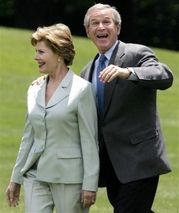We watched Three Days of the Condor last night and my, what a prescient movie. Robert Redford plays a man employed as a low-level CIA analyst, who reads all published books and tries to discern patterns in them (codes, recurring words, dirty tricks, etc.). He discovers that there is a secret cabal within the CIA that is planning an invasion of the Middle East solely to secure its oil. His report is passed to his section chief, one of the cabal, who then orders a hit on Redford's entire office to prevent the truth from making it to higher circles. Redford miraculously escapes, hides out for a few days in NY, then manages to get to the people at the head of the secret ring. In the end, with all the conspirators dead and the CIA higher-ups once again in control, Redford ends up talking to the head of the agency, Higgins, on a street in the city. Just as he had been warned by a free-lance hitman (played by the superb Max von Sydow) earlier, Higgins, whom he trusts, offers him a ride and Redford suspects that it will be his last. He declines, then engages Higgins in conversation about the plan to steal the world's oil. The crux of the thing is that Higgins, despite having just quelled a revolt from within his own agency, believes that the plan could have worked; the US could have taken over Middle East oil fields easily and would have then controlled the world. Redford, incredulous, asks him how that would gibe with our "cherished ideals" like democracy, free and open political communication, and respect for human rights. Higgins replies that he could not care less about those things and, at heart, neither could most Americans. "Ask 'em? Twenty years from now, when their heat doesn't work and they're cold, when people who have never known hunger begin to go hungry, do you think they'll want us to ask them? No, they'll just want us to get it for them" Higgins says. Then, he asserts that all dirty tricks are allowed, because "the other side plays games, too." Sound like anybody you know?
The only flaw I see in the film's prognostication is that it didn't aim high enough. Made in 1975, just two years after Nixon resigned, the filmmakers felt that the CIA was the biggest potential world-wrecker out there; not the White House. Spooks, they said, would subvert democracy and take over the world. Well, exactly 30 years on, it is in fact sitting presidents, their businessmen aides and fathers, and corporate interests that dictate our world domination fantasies. And popular culture of the kind Redford scanned in the film has become the conduit of propaganda of the simplest, most vile kind: totalitarianism dressed in a patriot's clothes. And those working to sew up the world's oil for their own profits no longer pretend to be serving the interests of "America" and they don't send coded messages in the pulp press; they call reporters at the New York Times and Time magazine; they hold White House press conferences and announce their "vision" to the whole world; they pay the American Enterprise Institute millions of dollars to draw up a plan of attack and then they pass it off as sound policy.
Ultimately, Redford and Higgins wind up in front of the New York Times building and Redford says that the game is up: he told the newspaper everything. Higgins looks sick. As Redford begins to walk away, though, Higgins smirks and says, "You can walk away, but it'll be a very short walk if they don't print it." Stumped, and growing nervous, Redford replies, "They'll print it," to which Higgins shoots back, "How do you know they'll print it?" Cut, lights, finis.
In 1975, two years after Watergate, a film came out that insinuated that the American press is just a tool of the government. Hooray for Sidney Pollack; I suppose he must be feeling very smart with his booby prize. And, lo and behold! Judy Miller is in jail, has been proven to be a lying tool of the White House, is protecting a traitor to this country with her silence, and yet, somehow, she's still on the payroll at the Times.





